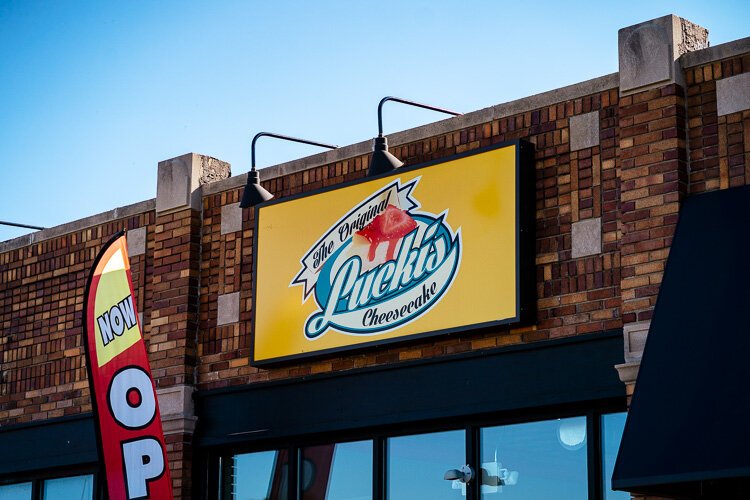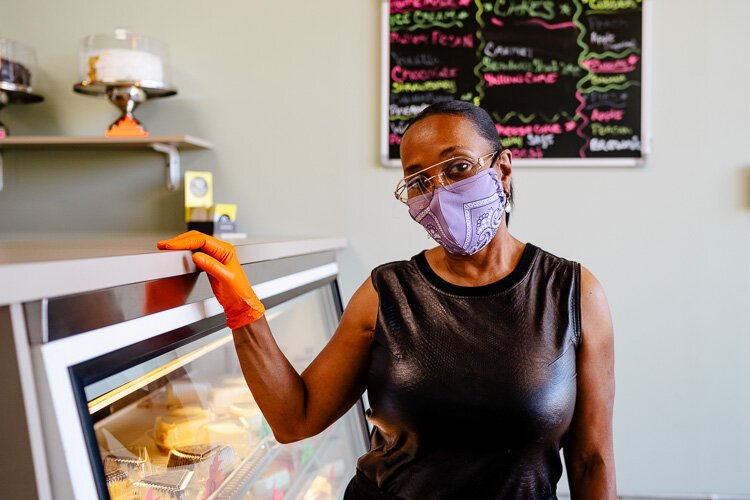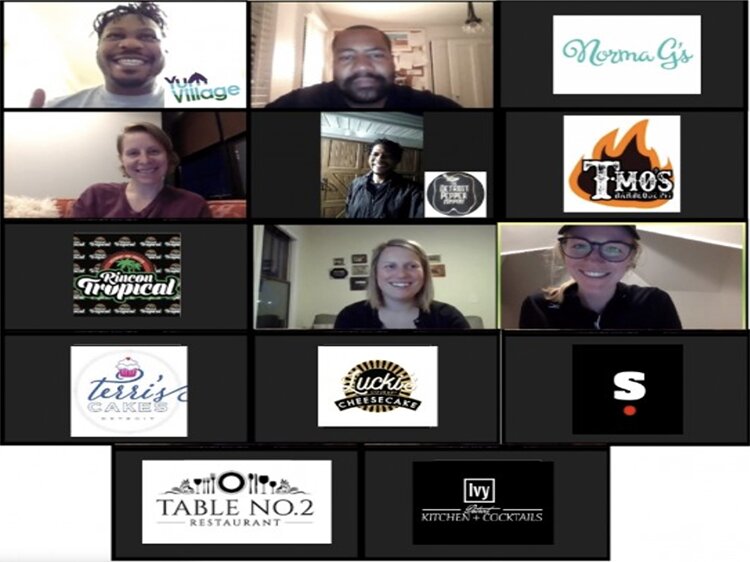Woodbridge resident and bakery ‘pay it forward’ as part of campaign to help underserved communities
With a mindset centered on equity, Pay it Forward co-founder Melanie D’Evelyn talks about the potential economic impact of COVID-19 and partnering with minority-owned small businesses, including Lucki's Gourmet Cheesecake, to help feed the city’s homeless during uncertain times.
When Melanie D’Evelyn and her husband, James Arnott, moved to Woodbridge from Ann Arbor last year, the couple were surprised by the genuine warmth of their new neighbors.
“I’ve just been so touched by how embracing this community has been,” d’Evelyn says, recalling the relationships they’ve built over the last year in their new home, which they purchased through Woodbridge Neighborhood Development (Disclosure: Woodbridge Neighborhood Development is the funder of this series). “In particular, my block — we’re a really tight-knit block and I’ve loved the friendships and relationships we’ve built with our neighbors.”
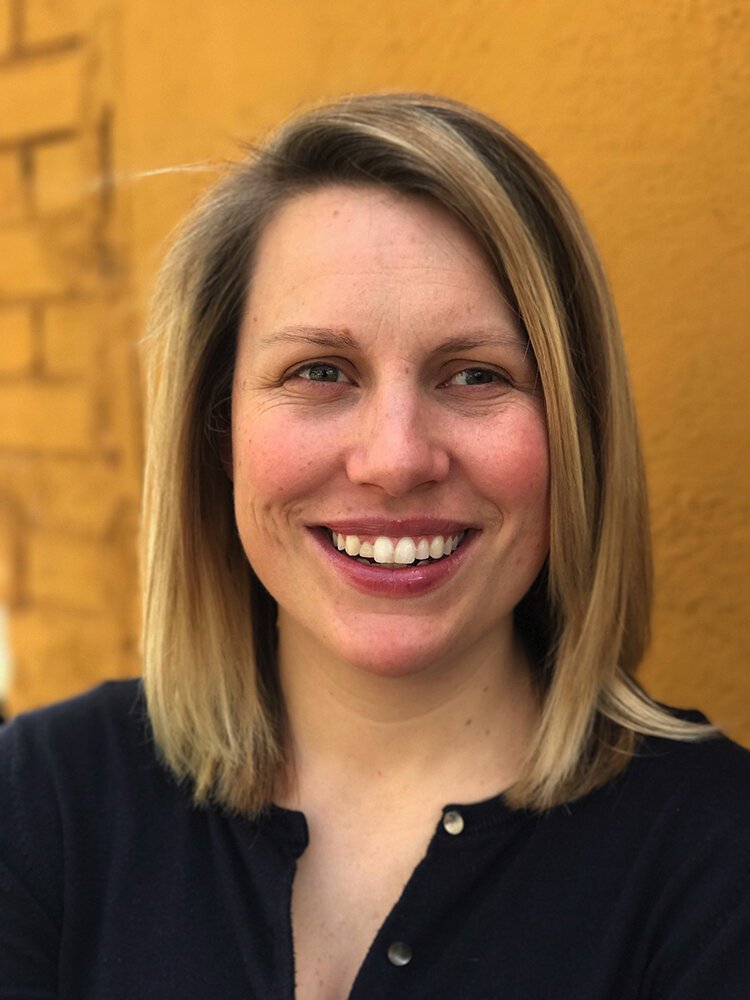
Despite being new to the neighborhood, D’Evelyn was no stranger to Detroit. As the director of Detroit Drives Degrees, a program of the Detroit Regional Chamber that focuses on increasing access to postsecondary educational opportunities for low-income students and students of color, D’Evelyn had spent the last five years working on education policy in the city.
With a mindset centered on equity and opportunity, D’Evelyn knew something needed to be done for marginalized communities in Detroit when the COVID-19 pandemic hit the city in March. After an executive order issued by Gov. Gretchen Whitmer shuttered the state’s restaurant scene (allowing takeout only) and many nonprofits began to struggle in the wake of the economic shutdown, D’Evelyn and a group of friends stepped in.
“It began when I saw that the Neighborhood Service Organization was looking for donors to pay for meals because they had to vacate one of their homeless shelters because of COVID,” D’Evelyn says. Quickly pivoting to meet the demands of the developing situation, D’Evelyn arranged a meeting with like-minded friends Sarah Craft, Shelley Danner, Jeremy Lewis, and Godwin Ihentuge to figure out a solution. “We all live and work in Detroit and are sort of impact-driven and equality-driven,” she says, adding they got together to explore how they could launch a crowdfunding campaign “to get people to pay businesses — power businesses, as we say — to feed the homeless.”
That initiative became Pay it Forward, a project serving the double purpose of partnering with nonprofits to feed the city’s homeless population while keeping local businesses afloat amid an unforeseen economic crisis. Launched in late March with an initial goal of raising $5,000 to provide meals for about two weeks, D’Evelyn says the group’s Patronicity campaign quickly surpassed their expectations as contributions flowed in from around the country, including foundations. “We ended up raising almost $55,000,” she says. “So we extended it to seven days a week and provided meals for eight weeks.”
In April, Pay it Forward provided over 5,000 meals for the city’s homeless with the help of NSO and Alternatives for Girls. At the peak of the campaign, D’Evelyn says the initiative engaged 15 local businesses including Black and Mobile, Yum Village (Ihentuge’s restaurant), Terri’s Cakes, Lucki’s Gourmet Cheesecake, and others. “We could have chosen any number of businesses to do this work, but we tried to be really deliberate about choosing minority-owned businesses right from the beginning,” D’Evelyn says.
“We thought this would be most impactful if we had it grounded in the various neighborhoods around the city,” D’Evelyn explains. “For me, living in Woodbridge, I really wanted a Woodbridge business because I thought it would be more compelling to my neighbors. […] We really wanted to champion some Black female business owners — and that was missing from our original lineup of folks, so we brought in Lucki’s.”
Named after owner Rhonda Crenshaw Morris’ daughter, Lucki’s Gourmet Cheesecake has been a popular spot for sweets on West McNichols in the Live6 corridor for over a decade. In March last year, Morris opened a second location on Trumbull in Woodbridge after being offered a spot in the business complex owned by Jim Geary, the former owner of nearby Woodbridge Pub. Morris says opening the second location was intimidating. “I said, ‘Jim, I’m scared. I don’t think I can do this.’ He said, ‘You can do it.’” And she did.
Even amid the pandemic, Lucki’s Trumbull location remained a popular local hotspot for Woodbridge residents seeking comfort food. Although Morris says she’s missed the students since WSU closed its campus, things surprisingly picked up at Lucki’s during the shelter-in-place order. “Honestly, we got busier …” she says. “People couldn’t do anything except buy food.”
Morris was able to keep all five of her regular employees on staff throughout the pandemic, and says her crew even had trouble keeping up with increased business at times. Still, she says it’s been difficult to find extra help due to the weekly unemployment benefits provided under the CARES Act, which ends on July 31. “The problem I’m having now is that I need people who want to work,” Morris says.
Despite those challenges, Morris jumped at the chance to give back to the community when she was approached by Pay it Forward co-founder Jeremy Lewis. After agreeing to partner with the initiative, Morris donated countless baked goods to feed homeless young women at Alternatives for Girls, a Detroit-based nonprofit that offers shelter, prevention, and outreach services to girls and young women experiencing homelessness, pregnancy, and exploitation including human trafficking. Morris says the spreads Lucki’s delivered to AFS included cheesecakes, bread pudding, sweet potato pie, and more.
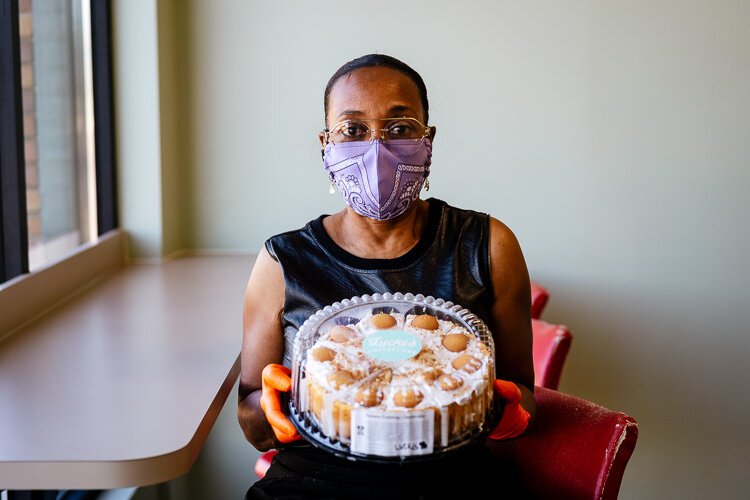
“I just love to give back,” Morris says. “If I can grow, I can make a difference in the world. […] It’s just a good feeling when you can help others and it’s coming from your heart.”
In spite of the positive impact of the Pay it Forward initiative, D’Evelyn says she and her co-founders wanted to find a way to create an impact that would last beyond their final meal delivery in June. “We’re really concerned, not just about this temporary attention on Black-owned businesses, but a more sustained, transformative approach to more equitability supporting minority-owned businesses,” she says. As part of that solution, last month Pay it Forward launched The Detroit Map of Black-Owned Businesses, created by volunteer Alexandra Fahoome.
Beyond supporting minority-owned businesses, d’Evelyn says policy is also important. In 2019, the median household income in Detroit was $29,481. Because Black people, who make up about 80% of the city’s population, historically earn less than other groups, D’Evelyn says she has concerns about the economic impact of the pandemic. “In times of economic devastation, that’s going to hit hard. There’s going to potentially be an increase in the number of homeless residents in our city,” she says. “These are tough policy issues that our region confronts. […] We have a big, generous heart in this city — but we need to remake the policy landscape to continue to make change in the right direction.”
This story is part of an ongoing series done in partnership with Woodbridge Neighborhood Development to highlight stories of resilience in the neighborhood.
